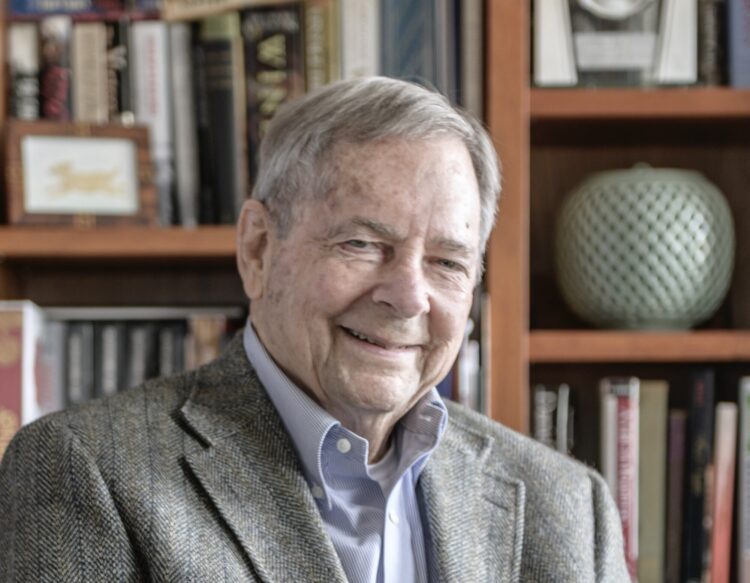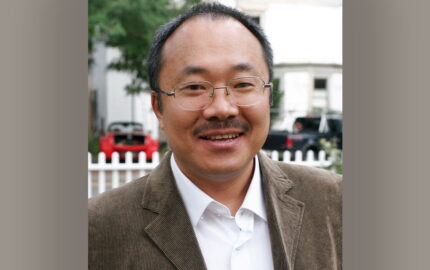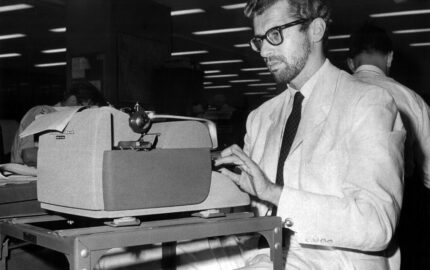Robert H. Giles, curator of the Nieman Foundation for Journalism at Harvard University from 2000-2011, died in Traverse City, Michigan, on August 7, 2023, after battling cancer. Known as Bob to friends and colleagues alike, he was 90 years old.
Under Giles’ leadership, the influential media news site Nieman Journalism Lab and the narrative journalism site Nieman Storyboard were launched; the annual Christopher J. Georges Conference on College Journalism began; and several national journalism awards were created, including the Taylor Family Award for Fairness in Journalism and the I.F. Stone Medal for Journalistic Independence. He additionally brought the Worth Bingham Prize for Investigative Journalism to Nieman and oversaw the expansion of Walter Lippmann House, Nieman’s office space on campus.
During his tenure, Giles selected several hundred journalists from around the world to study as Nieman Fellows at Harvard. He and his late wife, psychologist Nancy Giles, worked tirelessly to create a home away from home for all of them.
Current Nieman curator Ann Marie Lipinski said: “Bob leaves behind a community of devoted Nieman Fellows who treasured him for his grace and generosity. He cared deeply about the fellows and their families and together with Nancy placed a high value on building support for each year’s fellowship cohort. He well understood the pressures the journalists had been laboring under and worked hard to create a program that offered inspiration and a path forward.”
She added: “He grew Nieman in important and lasting ways, both through the physical expansion of Lippmann House and programmatic additions. Nieman Lab and Nieman Storyboard are the direct result of his leadership, helping to expand Nieman’s impact well beyond the campus experience.”
Among those chosen by Giles for the Nieman program were journalists forced to flee danger and persecution in their home countries; war correspondents arriving from the frontlines; small-town reporters with big ideas about the importance of local news; digital innovators and many others from diverse backgrounds united in their commitment to journalism.
Under Giles’s guidance, the foundation offered specialized fellowships to bolster global health reporting, community journalism, business reporting and arts and culture coverage. He recognized the impact of trauma on journalists and provided programming to help fellows cope with it on the job.
Giles was a Nieman Fellow himself in the class of 1966. As Nieman curator, he served as publisher of Nieman Reports and was a frequent contributor to the magazine.
A life in journalism
Born in Cleveland, Ohio, Giles was a graduate of DePauw University and earned a master’s degree from Columbia Graduate School of Journalism. In 1996, he received an honorary doctorate in journalism from DePauw.
Giles served in the Army before beginning his journalism career in 1958 at The Akron Beacon Journal. As managing editor there, he directed coverage of the campus shootings at Kent State University on May 4, 1970, a time when people in the United States were sharply divided over the Vietnam War. Four students were killed during an anti-war protest and National Guard soldiers also wounded nine other people. The paper’s coverage won a Pulitzer Prize for Spot News Reporting.
In 2020, he wrote and published “When Truth Mattered: The Kent State Shootings 50 Years Later” and recounted what happened that day and how his staff covered the events that rocked the nation.
Giles left the Beacon Journal in 1975 and taught as a professional-in-residence at the School of Journalism at the University of Kansas. From 1977 to 1986, he served as the executive editor and then editor of the Democrat & Chronicle and the Times-Union in Rochester, New York.
He joined The Detroit News as executive editor in 1986. As noted in The Harvard Gazette: “This was a tumultuous period in Detroit journalism. The paper was honored for its journalism, including a Pulitzer Prize in 1994 [for its coverage of a scandal in the Michigan House Fiscal Agency], but was faced with the challenges of a joint operating agreement with its rival, the Detroit Free Press, and a long, bitter strike that lasted for 19 months.”
Giles retired from The Detroit News in 1997 and joined the Freedom Forum as a senior vice president and executive director of its Media Studies Center in New York City.
Giles won the Scripps-Howard Foundation’s Distinguished Journalism Citation in 1978 for “outstanding public service in the cause of the First Amendment.” He also was elected to the American Academy of Arts and Sciences in 2012, the same year he was selected for a Yankee Quill Award from the Academy of New England Journalists. An eight-time Pulitzer Prize juror, he was the author of “Newsroom Management: A Guide to Theory and Practice.”
He served as president of both the American Society of News Editors and the Associated Press Managing Editors association and was a member of the ASNE Foundation Board and the board of directors of Harvard Magazine.
When Giles retired in 2011, he reflected on his time as curator in a lengthy Q&A about his Nieman work and spoke with The Harvard Gazette about his legacy.
After retiring from the Nieman Foundation, Giles and his wife Nancy moved to Traverse City, Michigan, where he was actively involved in civic and cultural groups, including the National Writers Series and the International Affairs Forum.
He is survived by his children, David (Ellen Katz), Megan (Jay Cooney) and Rob (Kelly Giles); four grandchildren, Walker and Caroline Cooney, Sadie and Ruby Giles, and two step-grandsons, Miles and Nick Johnson. His wife Nancy Giles died in 2021.
In his 2013 Nieman Reports article “A Gift Beyond Measure,” Giles wrote:
“‘The best year of my life’ is a common refrain at year’s end. Hugs, tears and words of appreciation don’t fully capture the meaning of this profound experience, but it is the best expression the Fellows can summon, as they depart with a sense of uncertainty but brimming with ideas and aspirations. For me, the privilege of serving as curator was also a gift beyond measure, 11 times over.”
Additional reading
- The Detroit News: Former Detroit News editor and publisher Bob Giles, who led paper to a Pulitzer, dies at 90
- Detroit Free Press: Robert Giles, former editor of The Detroit News, dies at 90
- Rochester Democrat and Chronicle: Bob Giles, newspaper editor in Rochester and Detroit, dies at 90
- The New York Times: Robert H. Giles, Newspaper Editor and Nieman Curator, Dies at 90
- The Boston Globe: Robert Giles, Nieman Foundation curator who oversaw Kent State shootings coverage, dies at 90
- The Harvard Gazette: Giles named new Nieman curator
- The Harvard Gazette: Nieman Foundation curator Bob Giles to retire
- Nieman Foundation: Nieman curator Bob Giles reflects on his time at Harvard
- From Nieman Storyboard editor Jacqui Banaszynski: Honor due reporter, editor and Nieman curator Robert H.Giles, 1933-2023



